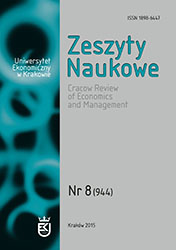Poczucie autentyczności jako czynnik wpływający na zaangażowanie pracowników
DOI:
https://doi.org/10.15678/ZNUEK.2015.0944.0807Słowa kluczowe:
autentyczność, zaangażowanie organizacyjne, zachowania kontrproduktywne, satysfakcjaAbstrakt
Poczucie autentyczności definiowane jako swoboda wyrażania uczuć i opinii w obecności przełożonego i współpracowników koreluje istotnie z zaangażowaniem organizaycjnym. Konstrukt poczucia autentyczności dotyka poziomu kontroli emocjonalnej wymaganej w danym środowisku pracy. Wysoki poziom kontroli przejawia się w działaniu powierzchniowym i powoduje emocjonalne wyczerpanie w pracy i w konsekwencji poczucie mniejszej autentyczności w pracy. Potrzeba kontroli emocji i zachowań zarówno w pracy, jak i wobec klientów lub szefa ma silny wpływ na indywidualne poczucie autentyczności pracy. Niskie poczucie autentyczności może powodować wiele zachowań związanych z oporem pracowników, generując zachowania kontrproduktywne, takie jak: poszukiwanie innej pracy, plotkowanie, załatwianie w pracy spraw prywatnych. Wyniki pokazują, że spadek poczucia autentyczności powoduje wzrost zachowań kontrproduktywnych i spadek zaangażowania organizacyjnego.
Downloads
Bibliografia
Algera P.M., Lips-Wiersma M. [2012], Radical Authentic Leadership: Co-creating the Conditions under which All Members of the Organization Can Be Authentic, „The Leadership Quarterly”, vol. 23, http://dx.doi.org/10.1016/j.leaqua.2011.11.010.
Bańka A., Wołoska A., Bazińska R. [2002], Polska wersja Meyera i Alen skali przywiązania do organizacji, „Czasopismo Psychologiczne”, nr 8.
Barret-Lennard G.T. [1998], Carl Rogers; Helping System. Journey and Substance, Sage, London.
Bechtoldt M.N., Welk C., Hartig J., Zapf D. [2007], Main and Moderating Effects of Self-control, Organizational Justice, and Emotional Labour on Counterproductive Behaviour at Work, „European Journal of Work & Organizational Psychology”, vol. 16, nr 4, http://dx.doi.org/10.1080/13594320701662618.
Chan K.W., Wan E.W. [2012], How Can Stressed Employees Deliver Better Customer Service? The Underlying Self-regulation Depletion Mechanism, „Journal of Marketing”, vol. 76, nr 1, http://dx.doi.org/10.1509/jm.10.0202.
Deci E.L., Ryan R.M. [1985], Intrinsic Motivation and Self-determination in Human Behavior, Plenum, New York.
Deci E.L., Ryan R.M. [2000], The “What” and “Why” of Goal Pursuits: Human Needs and the Self-determination of Behavior, „Psychology Inquiry”, vol. 11, http://dx.doi.org/10.1207/s15327965pli1104_01.
Erikson R.J. [1995], Our Society, Our Selves: Becoming Authentic in an Inauthentic World, „Advanced Development”, nr 6.
Fennis B.M. [2011], Can’t Get Over Me: Ego Depletion Attenuates Prosocial Effects of Perspective Taking, „European Journal of Social Psychology”, vol. 41(5), http://dx.doi.org/10.1002/ejsp.828.
Goldman B.M., Kernis M.H. [2002], True Self Goal Representations and Psychological Well-being, manuscript in preparation.
Harvey P., Martinko M.J., Gardner W.L. [2008], Promoting Authentic Behavior in Organizations: An Attributional Perspetive, „Journal of Leadership and Organizational Studies”, vol. 12(3), http://dx.doi.org/10.1177/107179190601200301.
Heppner W.L., Kernis M.H., Nezlek J.B., Foster J., Lakey C.E., Goldman B.M. [2008], Within-person Relationships among Daily Self-esteem, Need Satisfaction, and Authenticity, „Psychological Science”, vol. 19(11), http://dx.doi.org/10.1111/j.1467-9280.2008.02215.x.
Kahn W. [1990], Psychological Conditions of Personal Engagement and Disengagement at Work, „Academy of Management Journal”, vol. 33, http://dx.doi.org/10.2307/256287.
Kernis M.H. [2003], Toward a Conceptualization of Optimal Self-esteem, „Psychological Inquiry”, vol. 14(1), http://dx.doi.org/10.1207/s15327965pli1401_01.
Kernis MH. [2005], Measuring Self-esteem in Context: The Importance of Stability of Self-esteem in Psychological Functioning, „Journal of Personality”, vol. 73, http://dx.doi.org/10.1111/j.1467-6494.2005.00359.x.
Kwok C., Au W.T., Ho J.M.C. [2005], Normative Controls and Self-reported Counterproductive Behaviors in the Workplace in China, „Applied Psychology: An International Perspective”, vol. 54, http://dx.doi.org/10.1111/j.1464-0597.2005.00220.x.
Muraven M., Baumeister R.F. [2000], Self-regulation and Depletion of Limited Resources: Does Self-control Resemble a Muscle? „Psychological Bulletin”, vol. 126(2), http://dx.doi.org/10.1037/0033-2909.126.2.247.
Ozcelik H. [2013], An Empirical Analysis of Surface Acting in Intra-organizational Relationships, „Journal of Organizational Behavior”, vol. 34(3), http://dx.doi.org/10.1002/job.1798.
Rogers C.R. [1961], On Becoming a Person, Houghton Miffin, England, Oxford.
Spiecer A. [2011], Guilty Lives: The Authenticity Trap at Work, „Ephemera”, vol. 11(1).
Steele C.M. [1988], The Psychology of Self-affirmation: Sustaining the Integrity of the Self [w:] Advances in Experimental Social Psychology, vol. 21 Social Psychological Studies of the Self: Perspectives and Programs, Berkowitz, Leonard, Academic Press, San Diego, CA, US.
Susing I., Green L.S., Grant A.M. [2011], The Potential Use of the Authenticity Scale as an Outcome Measure in Executive Coaching, „The Coaching Psychologist”, vol. 7, nr 1.
Vohs K.D., Faber R.J. [2007], Spent Resources: Self-regulatory Resource Availability Affects Impulse Buying, „Journal of Consumer Research”, vol. 33(4), http://dx.doi.org/10.1086/510228.




